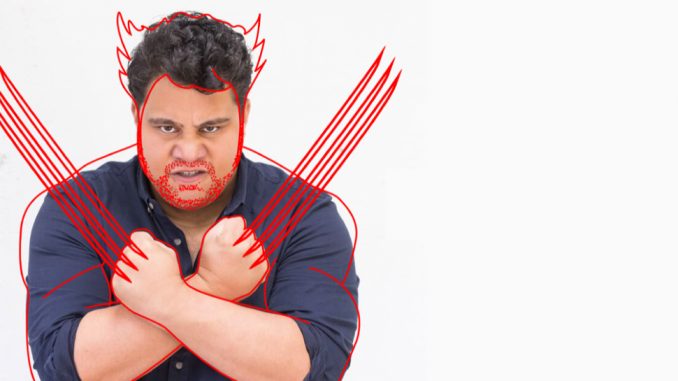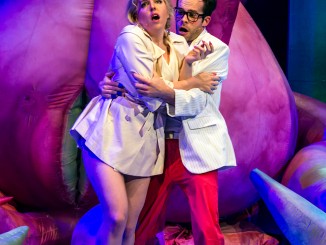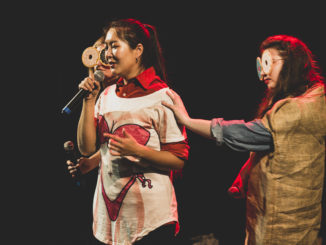
[MT Origins: Wolverine]
Here’s a Hollywood what-if for you: what if Hugh Jackman was never cast as Wolverine? He wasn’t the first choice. In fact, Jackman famously got the part after X-Men (2000) had already begun filming, when the original actor was injured shooting another movie. There was some disquiet about the choice of 6 foot 3 Jackman to play the 5 foot 3 brute, but now two decades later, Jackman has made such an indelible mark on the role it is difficult to consider anyone else playing the role (but cue the inevitable reboot in a few years).
With no Jackman as Wolverine, perhaps he would have remained a mostly stage actor. No Van Helsing, P.T Barnum or Jean Valjean.
In the alternative history where Dougray Scott (who?) remained as Wolverine, Rutene Spooner’s life might have played out a little differently too.
One of the sweetest moments in Super Hugh-man is when Spooner, a musical theatre newbie who had gained a place at the National Academy of Singing and Dramatic Art, realises that his childhood icon – the jacked-up, adamantium-enhanced, 5000 calorie per day burning, hyper-masculine Wolverine – was also a song and dance Jackman.
Directed by Jennifer Ward-Lealand with dramaturgy by Kate Prior, Super Hugh-man is Spooner’s affectionate tribute to the Aussie Hollywood and Broadway superstar. When Spooner was young, he wanted to be just like Jackman’s Wolverine, gelling up his hair and holding knives in his fists.
Armed with a guitar, Spooner paints a picture of his youth in Gisbourne. The pinnacle of Gizzy success was to make the Kapa Haka team. Spooner takes us through a Kapa Haka lesson, breaking down the components from entrance to exit. He does this with such charming assuredness – even simulating Poi while strumming on the guitar – that Stan Walker, part of last night’s audience, was moved to call out “Let’s go!”
Spooner channels Wolverine’s berserker spirit and the “drama queen makes the team”. Kapa Haka provided some cover from the merciless teasing he received for being into drama, such as getting called a “weirdo boy” and a “poof”. Spooner devised secret routes to get to the drama rooms at school unseen. At the end of high school his drama teacher handed him a flyer for NASDA in Christchurch.
Spooner’s is very much a performer’s story – a Billy Elliot of Aotearoa. He recounts his disastrous audition, finding out he was accepted anyway, and his painful rendition of The Mikado’s ‘Tit Willow’ to the whole school in his first year. At the school he felt out of place, a new two left-footed mutant amongst people who have known their superpowers for a long time.
It was there he discovered the other side to Jackman – the paragon of masculinity could more than hold a tune. We are treated to a stunning re-enactment of Jackman’s Tony winning performance of Peter Allen in The Boy from Oz. He does this with such charming assuredness – even breaking out into a tap dance – that Stan Walker was moved again to call out “Let’s go!”.
Spooner recalls being given advice that “you can’t rely on charm and talent, only hard work”. Super Hugh-man makes it clear he has these in abundance, and the work ethic to match. He strikes an easy, honest patter with the audience, and his vocals are a smooth, decibel-raising delight. He performs a number of tunes throughout the evening, including a brilliant Les Mis parody in which Spooner speak-sings commentary on the acting and filmic choices of the same song that Spooner is parodying.
Jackman’s roles are an effective conduit for the show’s story. We don’t get much beyond Jackman’s superficial star image – nothing about Jackman’s own biography and how he made it – but the show is a testament to just how quietly influential Jackman has been in moving between the Marvel and Musical Universes and normalising a masculinity unconfined by limited assumptions.
Super Hugh-man is about a person figuring out they are good at something and trying to find a place where they can express it. It doesn’t lay on its metaphors too thickly, because it doesn’t need to. As the X-Men film series was about difference, stigma, and acceptance, so too is Spooner’s. Super Hugh-man is one of those feel good, affirming stories that happily comes off as honest rather than calculated; satisfying your inner comic book and theatre geek, it makes the world a little brighter.
The show does lose momentum as it approaches its conclusion. Spooner conceptualises a glorious return for Jackman in Wolverine: The Musical. It’s a logical place for this show to go, performed with high kick gusto by way of Chicago and A Chorus Line, but I long for some dramatic claws to burst out; for Spooner to find some deeper poignancy within the parody.
The problem is that Spooner’s autobiography all but dries up after musical theatre school. It had been Spooner’s story, not Wolverine’s, that provided the show with its heart. Beyond hearing that Spooner was cast in a production of Oklahoma, just like his idol, there is nothing about Spooner’s experiences trying to make it in New Zealand’s tough performing arts industry since his graduation in 2009. Spooner’s story, and therefore the show’s, feels incomplete.
Following seasons of Super Hugh-man in Auckland, Hamilton and Palmerston North, Spooner is crossing the ditch to perform in Australia, bringing him that little bit closer to Jackman. Maybe, just maybe, he will find an ending to his show over in Oz. Hugh never know.
Super Hugh-man is presented by Metro Māori Productions and SquareSums&Co and plays at Q Loft until 30 June.
SEE ALSO: Tim George’s review of the debut 2017 Auckland season.




Leave a Reply